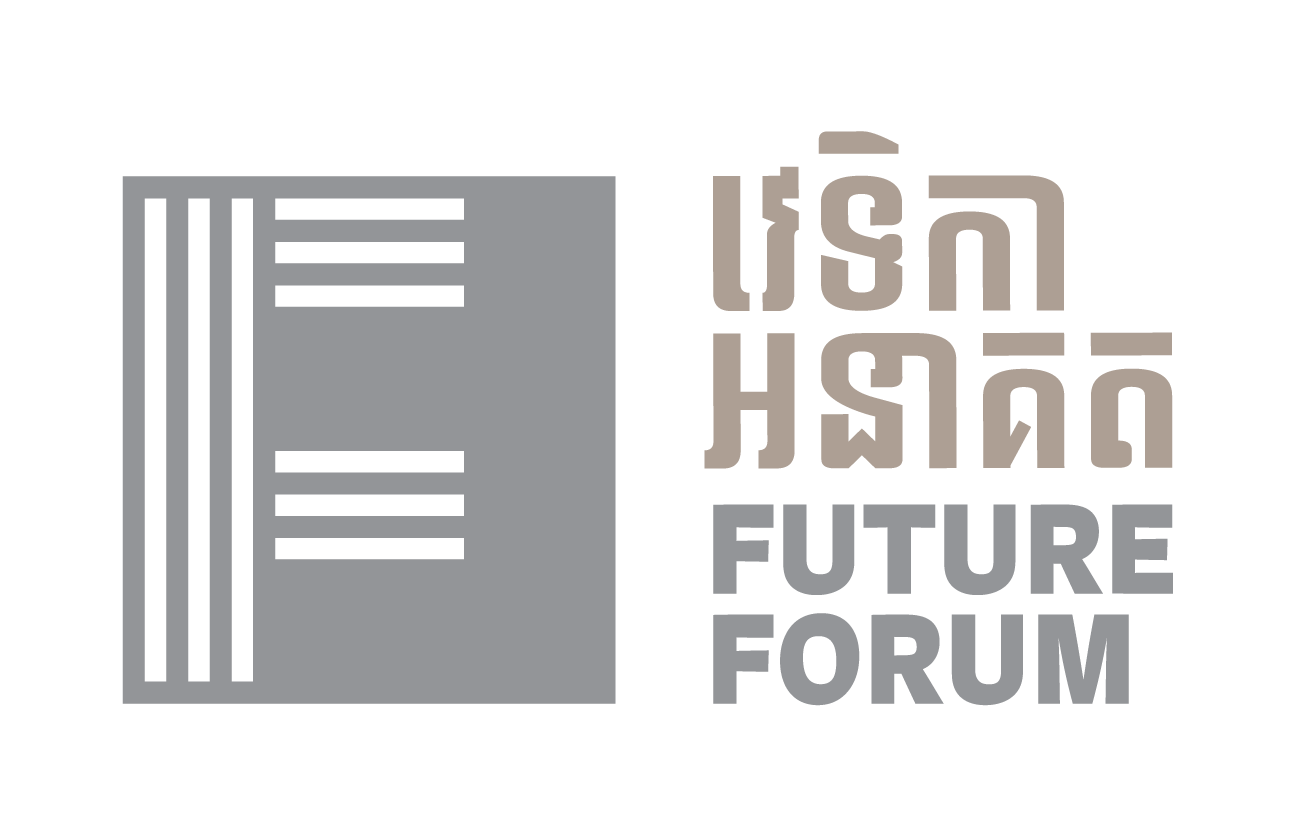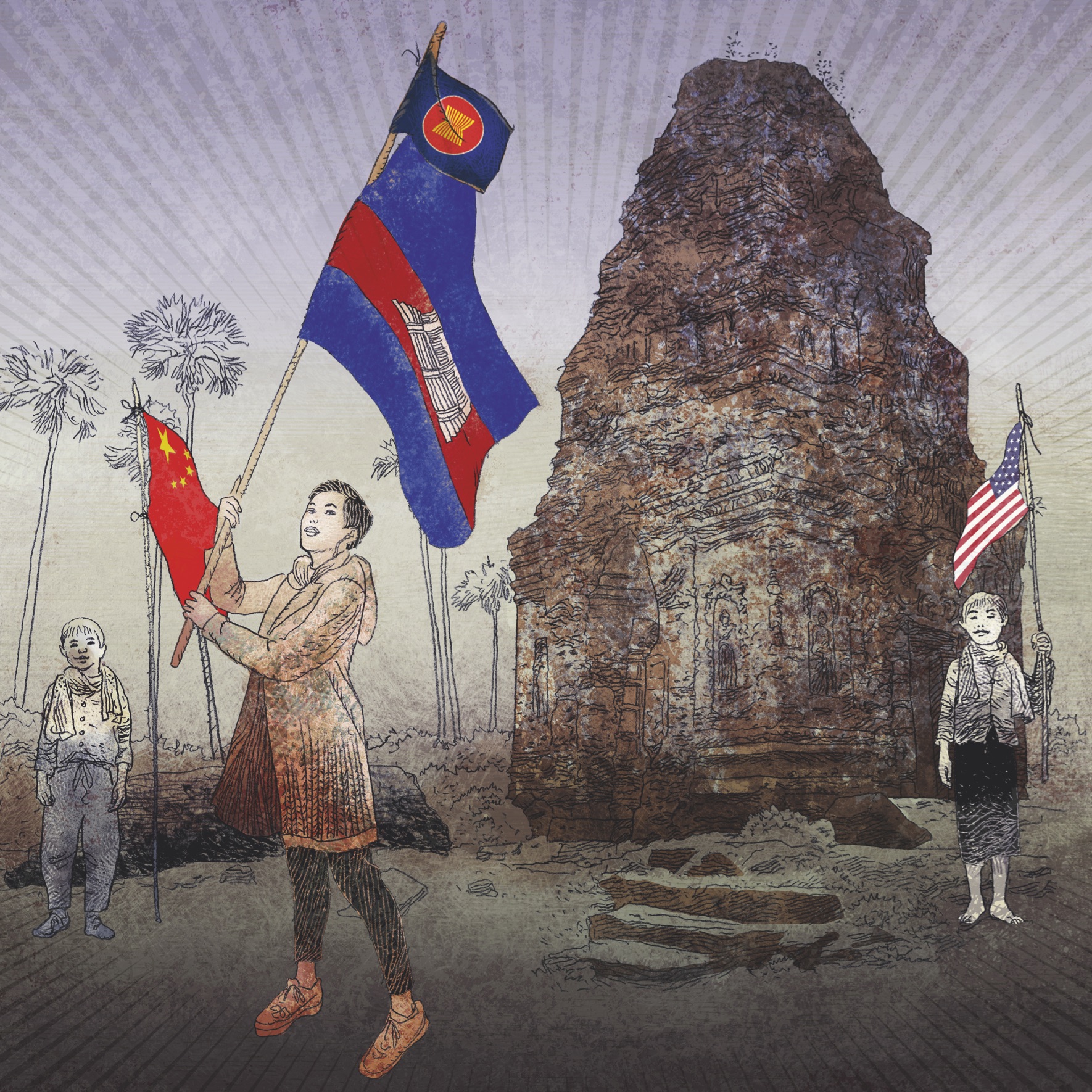Illustration by Séra
Striding across the verandah of his Phnom Penh home on November 11, Cambodia’s embattled opposition leader Kem Sokha stuck out a hand towards US Ambassador W. Patrick Murphy, the two men sharing a few inaudible pleasantries during their quick grip-and-grin after Murphy’s official car had edged through Sokha’s front gate.
Back at the doorway an hour later, Sokha apologised to the waiting media for not commenting. Though a local court freed him from house arrest the weekend before, he remains barred from politics due to treason charges, so was reluctant to discuss his meeting with Murphy.
Sokha’s plight, it seems, is to be a pawn in the Cambodian government’s game with the big powers it must do business with – his release likely an attempt by nervous authorities to gainsay any European Union (EU) move to cut the country’s preferential market access, known as “Everything But Arms (EBA)”, to the 28-member bloc.
In 2018, Cambodia’s exports to the EU were worth 5.4 billion euros (US$5.94billion), going by European Commission figures, with around a third of Cambodia’s US$9.5billion total of garment and footwear exports going to the EU.
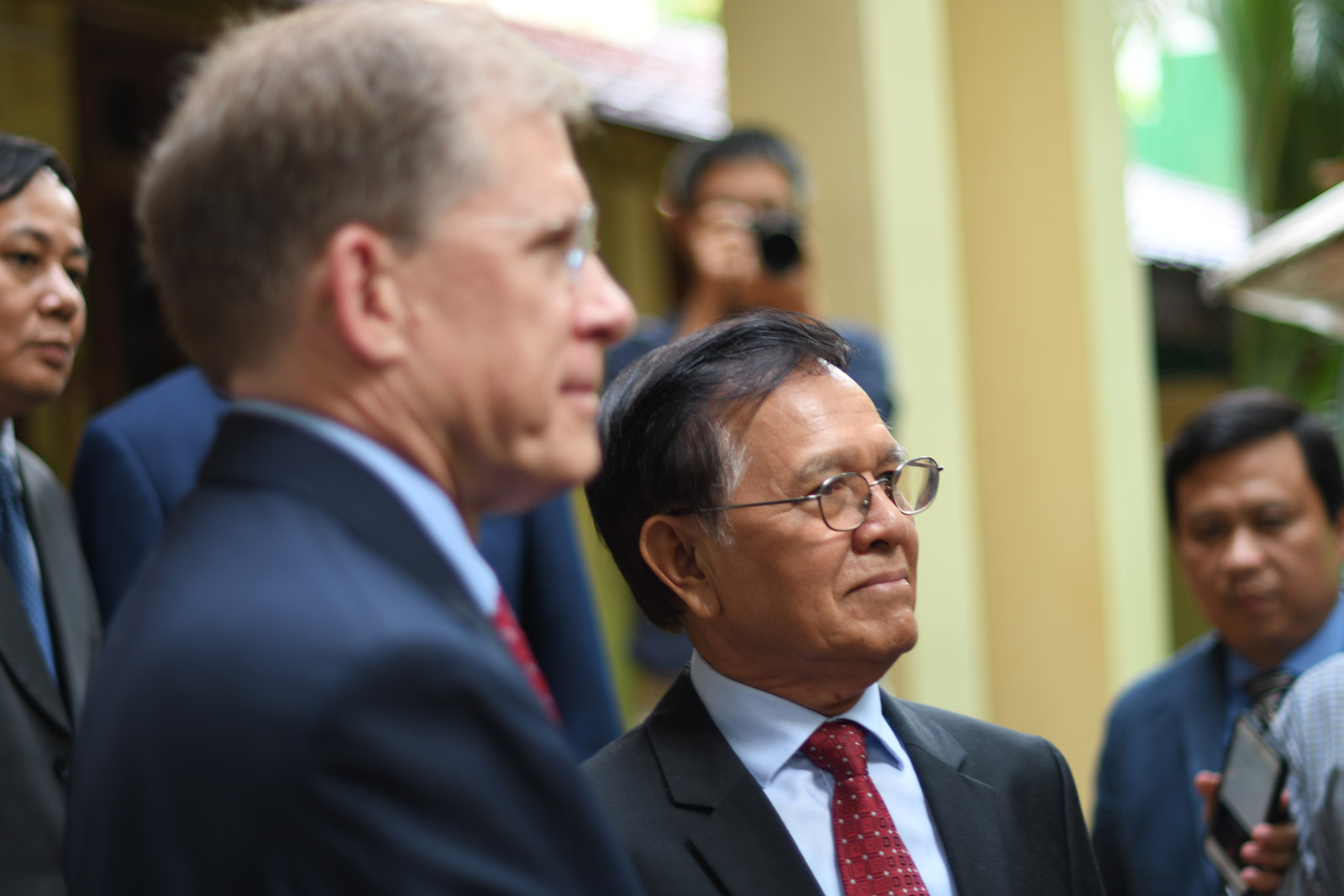
The possible revoking of the EBA privileges – according to the Commission, one of the three main EU bodies – is due to the deteriorating human rights situation in Cambodia over the two years since Sokha was arrested, accused of conspiring with the US to foment a “colour revolution” to unseat the near four-decade rule of Prime Minister Hun Sen.
Despite Sokha being freed from house arrest a month ago, it was later announced that he will face trial on January 15, a decision that is unlikely to bolster Cambodia’s case for avoiding sanctions. To Kem Monovithya, a leading opposition politician and a daughter of Kem Sokha, the decision to try her father shows “there is no good will from the CPP [Cambodian People’s Party] controlled court”.
Nobody can stop China, not even USA, China will continue to rise, we have to accept that and make our own adjustment accordingly
Pou Sothirak, Cambodian Institute for Cooperation and Peace
It is not just opposition leaders who have been targeted. Though most have since been freed, dozens of local opposition activists were rounded up in the weeks prior to Sokha’s release, as the government issued lurid jeremiads about a coup attempt allegedly being orchestrated by Sokha’s fellow opposition leader Sam Rainsy.
“We are very concerned about the human rights situation there. The Cambodians now have one month to respond and we will make our final decision in Feb next year,” commented outgoing Commission trade chief Cecilia Malmstrom in a 12 November post on Twitter.
Flawed elections
The EU’s move to reassess Cambodia’s market privileges is also due to 2018 national elections in which all 125 seats were won by the ruling CPP, after Sokha and Rainsy’s Cambodian National Rescue Party (CNRP) was banned after running Hun Sen’s CPP close in 2017 local or commune elections.
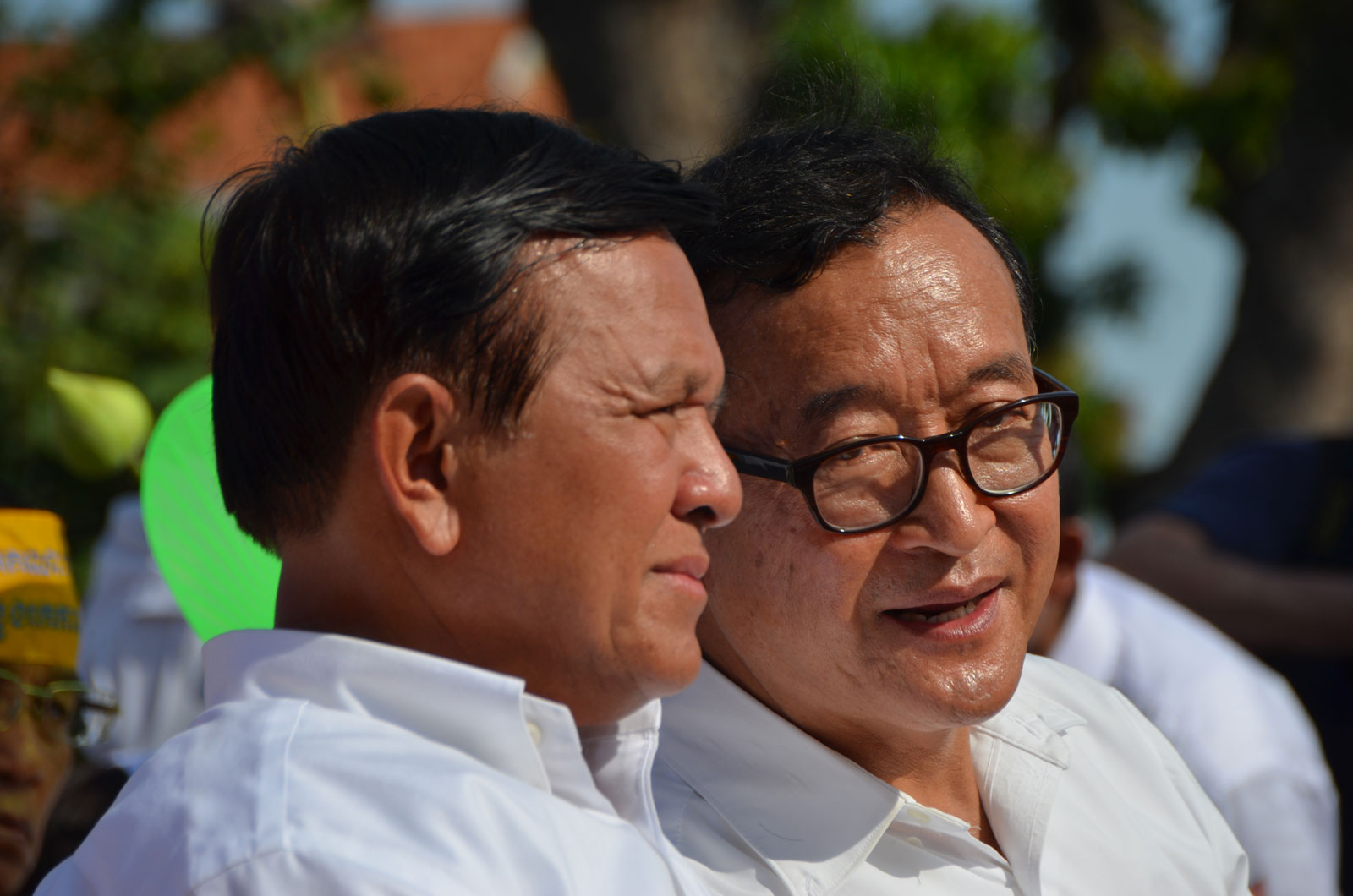
“Cambodia is now a non-democracy, dropping last year because of the way the election was held,” said Leena Rikkilä Tamang, Asia and Pacific Regional Director at the International Institute for Democracy and Electoral Assistance (IDEA), a Sweden-based intergovernmental organisation.
Published in November, International IDEA’s biennial review of democratic reforms found that though 62% of countries are regarded as democratic today, compared to only 26% in 1975, the number undergoing “democratic erosion” has more than doubled over the past decade.
Such “backsliding” has come as high-growth authoritarian regimes out-perform Western democracies economically, and none more so than China, which over the past decade has drawn a seemingly willing Cambodian government into its widening sphere of influence.
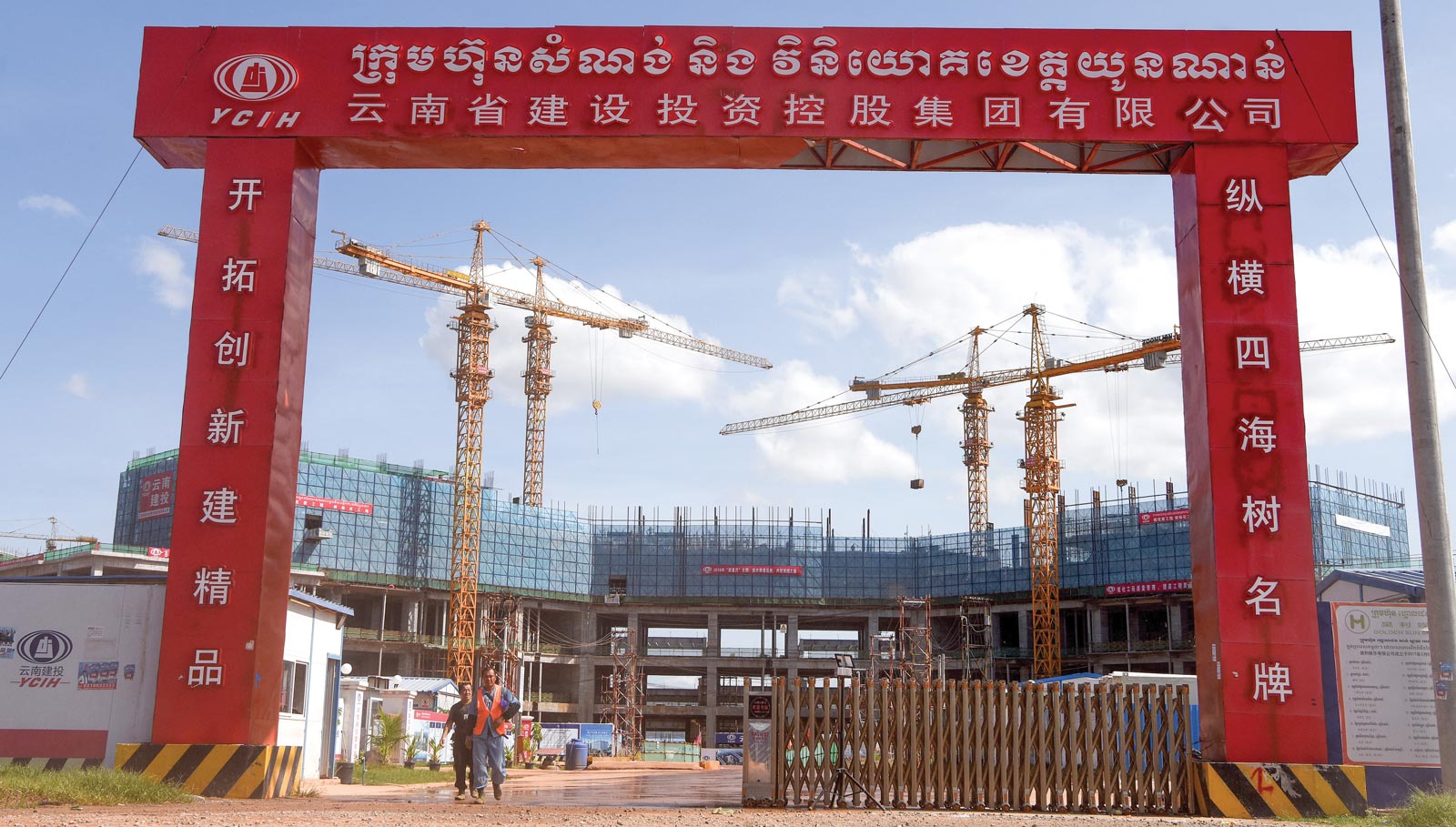
“Nobody can stop China, not even [the] USA, China will continue to rise, we have to accept that and make our own adjustment accordingly,” said Pou Sothirak, a former ambassador and Cambodian government minister, speaking at a recent seminar at Chulalongkorn University in Bangkok. Sothirak is Executive Director of the Cambodian Institute for Cooperation and Peace (CICP) and a contributor to Cambodia 2040, a series of essays to be published early next year by Future Forum, a Phnom Penh-based think tank.
40% of Cambodia’s imports come from China, which is also the biggest source of investment into the Kingdom – the glass and concrete fruits of which can be seen towering over Phnom Penh and boomtowns such as Sihanoukville.
Cambodia needs to avoid the undesirable impact from the trade war between the United States and China as well as the removal of EBA
Sithy Rath Daravuth and Vrak Thanit, Cambodia 2040
Sophal Ear, associate professor at Occidental College in Los Angeles, said that China’s economic influence over Cambodia looks set to increase. “Cambodia’s domestic politics is increasingly driven by the knowledge that Beijing will back Phnom Penh financially and politically, enabling a ‘West be damned’ view of things,” he said.
However Cambodia relies on Europe and North America as buyers of the apparel exports made by hundreds of thousands of factory workers, with the European Chamber of Commerce in Cambodia warning in November that 90,000 jobs could be lost if EBA trade preferences are cut.
“Cambodia needs access to Western markets,” said Katrin Travouillon, a Cambodia expert at Australian National University’s Coral Bell School of Asia Pacific Affairs. “With or without support from China, the political and economic fallout [of losing EBA access] would be immense,” she added.
In 2020, Cambodia will for the first time host the Asia-Europe Meeting (ASEM), a biennial political dialogue forum involving 53 countries from the two continents. If EBA access ends up being revoked, it could make for an awkward meeting, not least as Cambodia’s ties to countries closer to home have also taken a hit over recent actions by Hun Sen’s government. These include attempts to browbeat neighbouring countries into denying opposition leaders passage home in the weeks leading up to Rainsy’s much-hyped 9 November return, with Cambodia’s ambassador in Indonesia storming a press conference held in Jakarta by senior CNRP figure Mu Sochea the week before Sokha was freed from house arrest.
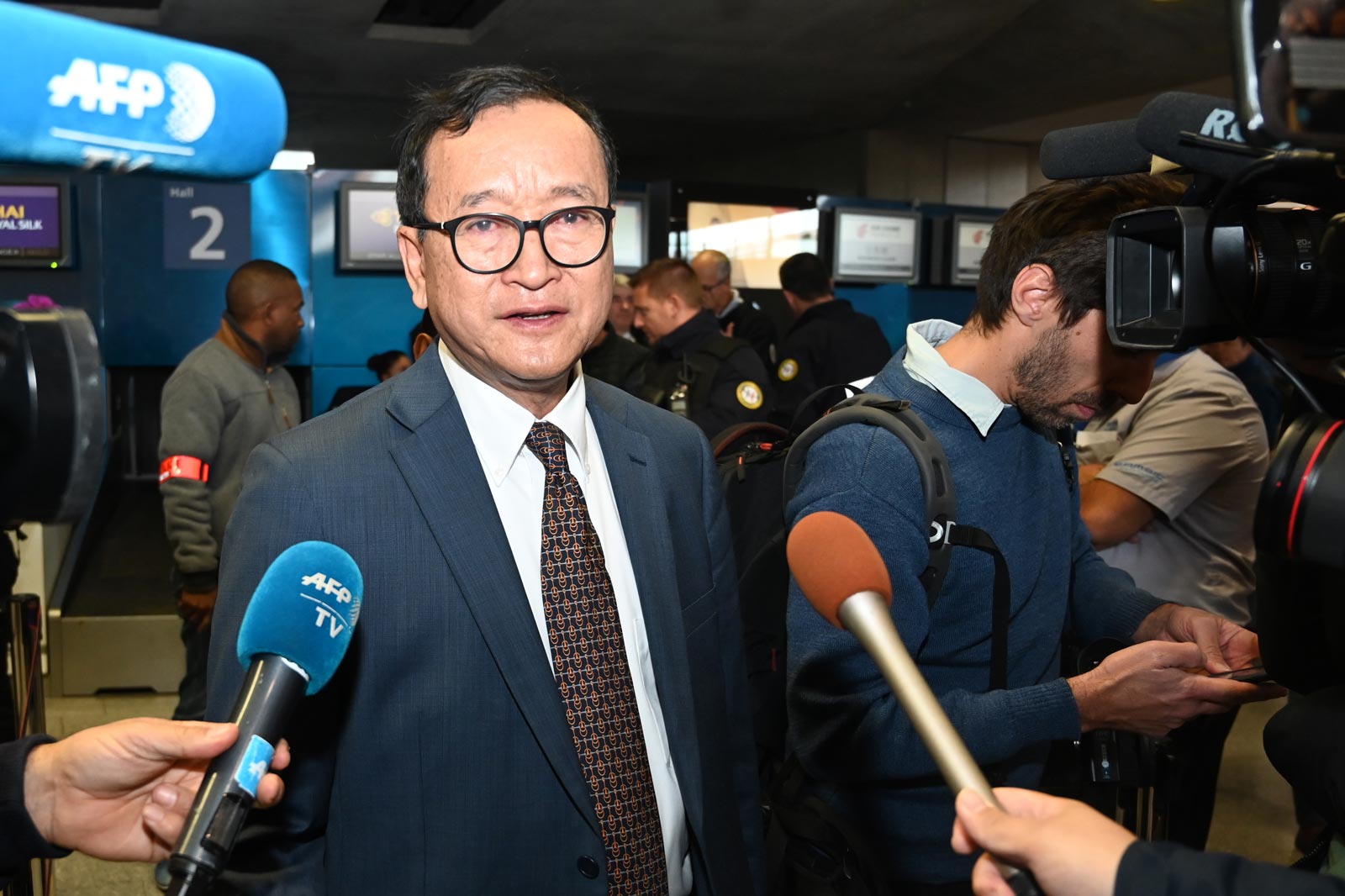
Sokha’s release came as Rainsy flitted from Paris to Kuala Lumpur, and later Jakarta, after his far-fetched plans – to land in Bangkok before leading thousands of Cambodian foreign workers across the border – were scuppered as Thai Airways blocked Rainsy from boarding a flight from his exile in Paris. Even neighbouring democracies such as Indonesia and Malaysia appeared hesitant at first about allowing entry to Rainsy and Sochua, with the latter detained for hours at Kuala Lumpur International Airport.
In the eyes of those neighbouring democracies, the US has arguably seen its reputation diminished after sending a relatively low-level delegation to the recent Association of Southeast Asian Nations (ASEAN) summit. And though Ambassador Murphy stood alongside Sokha on 11 November, the US is unlikely to try to compel Hun Sen to remove all restrictions on the opposition.
While the US under President Donald Trump appears determined to undermine China’s growing economic, military and technological prowess, the concern is that the stand-off – and whatever American attempts are made to cajole Chinese allies to its camp – could be at the expense of causes such as democratisation and freedom of speech.
“Given the new orientation of US foreign policy perhaps democracy and human rights are not so high on the agenda,” said International IDEA’s Leena Rikkilä Tamang.
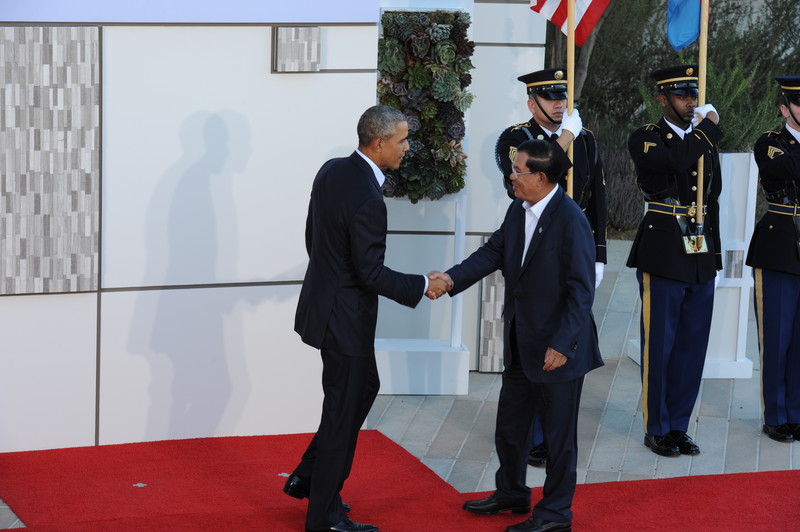
The US’ focus on Cambodia has waxed and waned over recent decades, from bombing the country during the 1960s and 70s, to failing to do much to stop the ensuing takeover by the Khmer Rouge, to fleeting attention allocated during the 2008-16 Obama administration’s ill-fated “pivot to Asia”.
“Our [US] history with Cambodia is fraught, to say the least; the understanding of the country is superficial; and Cambodia’s authoritarian rule fits into a pattern of the whole region,” said Elizabeth Becker, a journalist and author who reported from Cambodia during the Khmer Rouge era in the late 1970’s.
Mekong countries need to be cautious of being trapped in a geopolitical risk and its subsequent negative implications
Pich Charadine, Cambodia 2040
Lawmakers in the US have threatened to revoke Cambodia’s preferential access to the American market via the Generalized System of Preferences (GSP), an EBA-style set of trade privileges, also passing the Cambodia Democracy Act in mid-2019, which would allow punitive action to be taken against high-ranking Cambodian officials.
After hearing in early December that the case against her father would proceed, Kem Monovithya said that “the regime should be reminded that US Congress is moving forward with legislation that will see individual sanctions and GSP suspension, if they insist to convict Kem Sokha on treason charges with the US”.
It is anyone’s guess whether or not the famously-erratic President Trump will back suspension of trade privileges. On 9 December, the same day the Sokha trial date was announced, the US Treasury Department sanctioned two tycoons connected to the Cambodian government. However those measures came after a 1 November letter in which Trump reassured Hun Sen that “we do not seek regime change”.
Trump’s note, which included a request to “put Cambodia back on the path of democratic governance”, prompted a grateful reply from Hun Sen on 26 November, in which the Cambodian strongman suggested the two countries let bygones be bygones.
Closer to home
Caught up in the increasingly fraught China-US rivalry, Cambodia’s future could be to rely more on regional bodies and closer ties with smaller neighbours to offset a dependence on China that the US and its irascible president could deem provocative, regardless of any reassuring letters.
“Mekong countries need to be cautious of being trapped in a geopolitical risk and its subsequent negative implications. The region will need to be prepared to align itself toward a plausible hedging strategy that would associate with minimal risks,” writes the CICP’s Pich Charadine, in another chapter in Future Forum’s Cambodia 2040.
However Pich cautions that aside from ASEAN, a ten-country regional bloc of which Cambodia is a member, the smaller and issue-focused Indochina groupings are relatively unimportant.
The one exception is the China-driven Lancang-Mekong Cooperation (LMC) body, which was launched in 2015, which Pich describes as “indeed the most critical and the most strategic Mekong mechanism among all given its astonishing speed of institutional developments and project implementation”.
And while the various Mekong-based groupings have seen a spike in activity since China started pushing the LMC, to many Cambodia would still be wise to broaden its diplomatic and economic horizons as it charts a path to 2040 and potentially a world in which China has succeeded the US as primus inter pares.
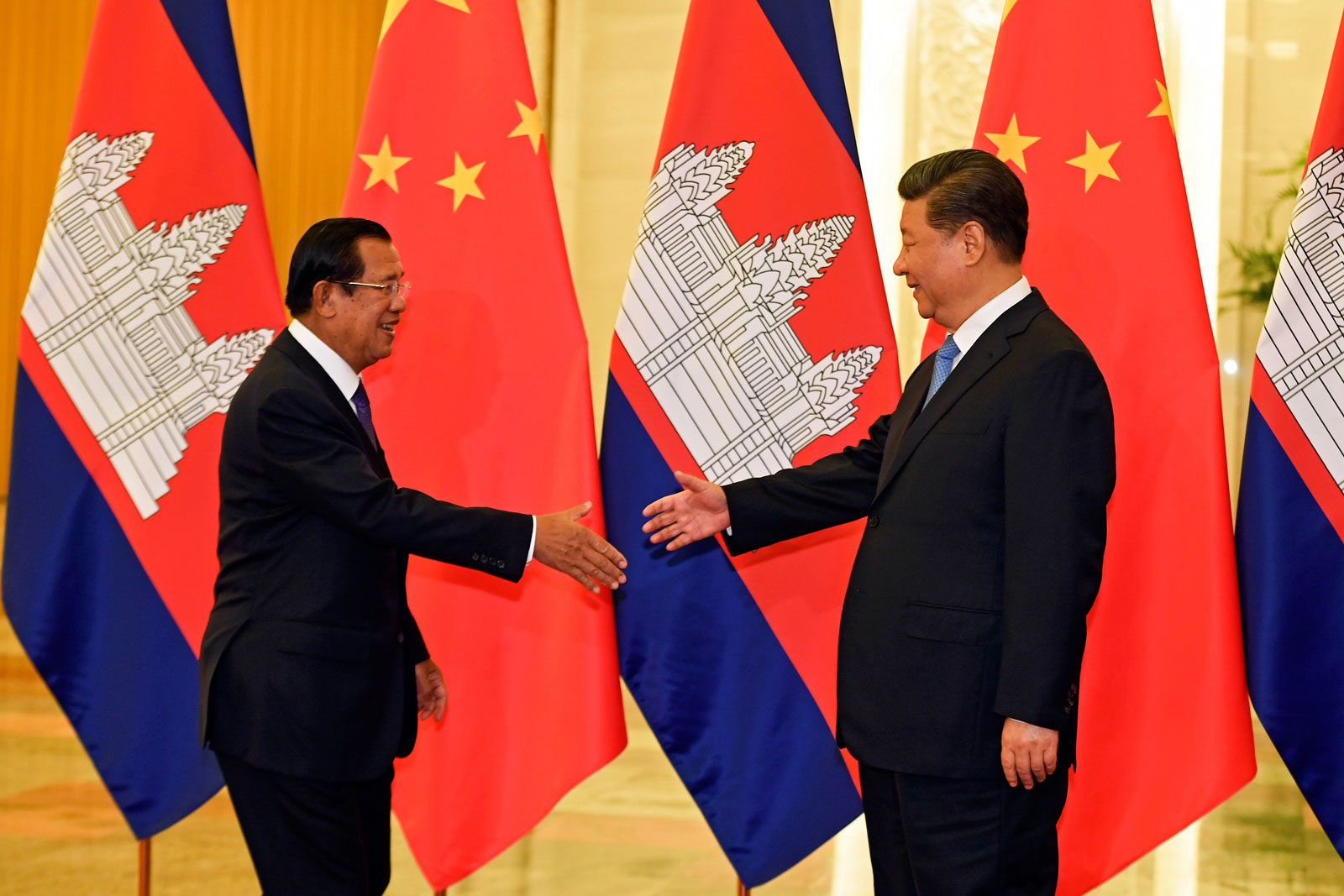
As a small and open economy, Cambodia is exposed to changing international trends. Sithy Rath Daravuth and Vrak Thanit acknowledge this vulnerability in their forthcoming chapter on the country’s economic diplomacy prospects up to 2040, where they warn that Cambodia needs to “avoid the undesirable impact from the trade war between the US and China as well as the removal of EBA”. Cambodia, they write, “could try to assert itself in joining APEC,” the Asia Pacific Economic Cooperation group of 21 countries.
President Trump appears keener to interact with APEC than other Asia-Pacific bodies or fora, such as ASEAN’s East Asia Summit, which he skipped in 2018 and 2019, causing many in Southeast Asia to wonder about US commitment to the region. Whether or not Cambodia can weave its way into APEC – given American domination of that organisation and Phnom Penh’s alignment with China – could hinge on getting the backing of the seven APEC members that are also part of ASEAN.
However, the Hun Sen government’s close ties to China are not necessarily appreciated elsewhere in the region, even in an ASEAN that is increasingly dependent on Beijing – the bloc’s biggest trade partner and likely source of future-facing technologies such as 5G. Proponents claim that the technology will enable the mainstreaming of the so-called “internet of things” – technological advances that could leave the world in 2040 very different from today.
Cambodia is a small but potentially key notch in the Belt and Road Initiative, a huge China-led intercontinental infrastructure mega-project, meaning that, according to Sophal Ear, “other ASEAN member-states are alarmed by the capture of Cambodia by Beijing”.
“With a Ream naval base and Dara Sakor, China could bomb targets in Southeast Asia within minutes. This is not something Singapore or any of the other ASEAN member countries want,” Sophal said, referring to two locations along Cambodia’s Gulf of Thailand coast that have allegedly been commandeered by China.
With China set to pass the US as the world’s biggest economy before 2040, its sway over Cambodia is looking irresistible. However, Becker dismissed the idea that Cambodia was doomed to end up a Chinese vassal, saying that “historically, Cambodia has been in the sphere of India”.
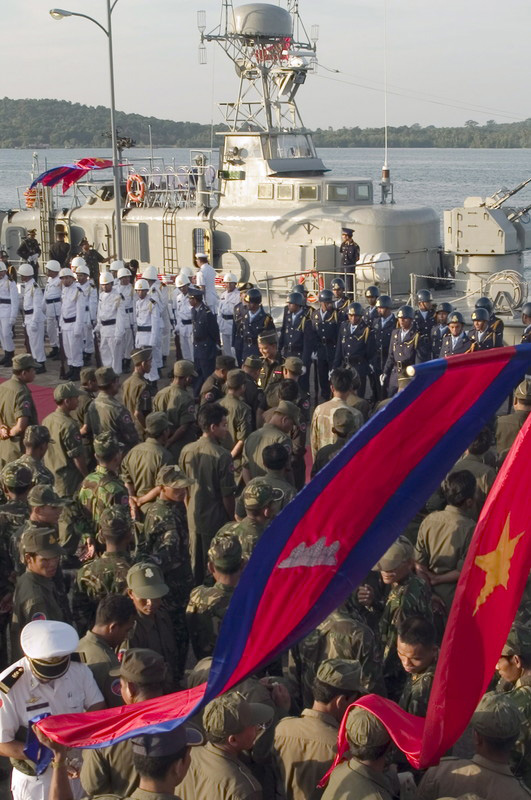
“Cambodia’s neighbours, Thailand and Vietnam, were the countries most threatening to control the Khmer kingdom before the colonial period when France took over,” she said, pointing out that Chinese dominance of Cambodia need not be seen as inevitable.
To some observers, a less-confrontational approach by Western powers might be welcomed by Cambodian officials concerned about Chinese dominance.
According to Kosal Path, a political science professor at Brooklyn College at The City University of New York, the CPP includes a faction of younger members, who, “while tilting toward China for economic assistance, investment and access to China’s market”, all the same “don’t want to see Cambodia becoming overly reliant on China”.
“Many political actors are alarmed by the increasingly close relations,” said ANU’s Travouillon, referring to China-Cambodia ties. All the same, however, she said that “Cambodian government officials feel patronised by Western representatives”.
Such perceived condescension, to Kosal Path, has hardened the stance of a group of loyalists close to Hun Sen. In their eyes, he said, “the West has been one-sided, supporting the opposition party against the ruling party, and used the issue of democracy and human rights to undermine the legitimacy of the ruling party and ultimately usher a regime change in Cambodia”.
This article has been researched and written in partnership with Future Forum, in the lead up to Future Forum’s upcoming Cambodia 2040 book launch. Find out more here.
